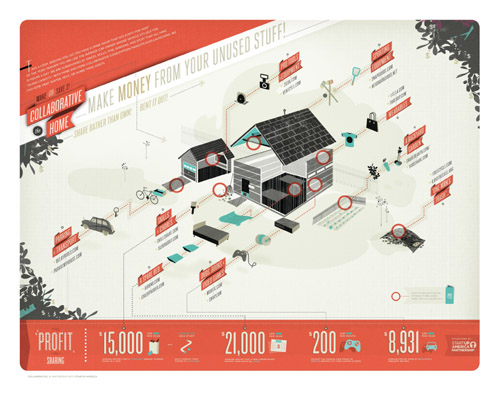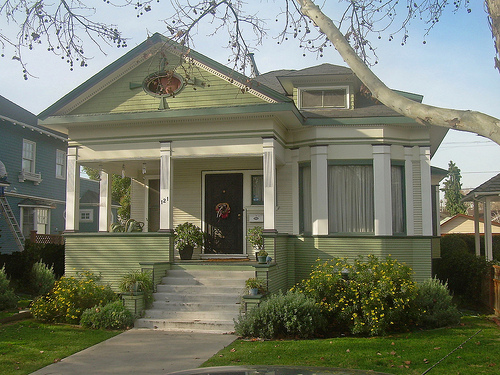UPDATE: We've summarized much of the series this article is part of in a new report, Policies for Shareable Cities: A Sharing Economy Policy Primer for Urban Leaders. Get your free copy here today.
Our homes are the most obvious hubs for the sharing and collaborative consumption movements. After all, we live in them, and so does most of our stuff. Sharing our car, sharing our vacuum cleaner, borrowing and lending household goods, offering our homes as a temporary place for others to stay – these are all activities that make a great deal of sense – from economic, efficiency, and ecological standpoints. Generally, there are almost no legal barriers to these sharing activities, so long as they are happening on a casual, occasional, and uncompensated basis.
But what if we want to get more organized about our sharing, and maybe even share the costs of things like owning a car and certain household goods? Perhaps we want to earn a profit. As the folks at Collaborative Consumption have pointed out, there is HUGE potential to make money by sharing what is in our home.
This year, we’ve seen Mutual Aid in Motion.
From scaling sharing hubs to Mutual Aid 101 trainings, we’re helping communities build the tools they need.
Every dollar fuels lasting resilience – proving that when we move together, we all move forward.

The Collaborative Home as drawn by Collaborative Consumption. Used under Creative Commons license.
Unfortunately, legal barriers begin to kick in when we turn our household sharing activities into money-makers. We have already discussed these barriers in our article on Collaborative Consumption’s Legal Paradox. To sum up the barrier: in most residentially zoned areas of a city, residents are very limited in the types of businesses they can engage in at home. Home offices tend to be okay, as do some tutoring activities; but any businesses that involve more than a few visiting customers, or that involve keeping an inventory, tend to be disallowed.
Here are a few suggestions for ways that a city can encourage people to share what they have in their homes. We encourage readers to post additional suggestions in the comments area:
- Allow community gathering activities in homes: Cities should consider expanding the list of allowable community gathering activities in residential areas. In most cities, zoning barriers could arise if someone wanted to use their home as a community gathering space – for example, to host cooking, garden, or yoga classes; to hold house concerts; to host regular food swaps or underground restaurants; or to offer the yard as a community garden. While we are all allowed to hold a reasonable number of gatherings in our home, cities do tend to object when such gatherings become regular or involve money making. In many residential zones in Oakland, California, for example, residents would need an expensive conditional use permit in order to engage in activities defined as Community Assembly, Recreational Assembly, and Community Education activities.
- Allow people to sell produce grown in backyards: Our food system probably cannot get any more local than a neighborhood-based vegetable delivery service. Sophie Hahn of Berkeley, California, began selling weekly vegetable boxes to a few of her neighbors, only to learn that the city zoning prohibited such activities. Cities should follow in Oakland’s footsteps and allow people to sell produce they grow in their backyards.
- Expand allowable garage and yard sale activities: Many cities put a cap on the number of yard sales that a property can host each year; for example, in Dallas, Texas, the limit is two per year. Other cities impose limitations that prevent a person from turning their garage sale into a regular retail location. For example, a city might specify that you can only sell your own belongings, and not things you bought for the sole purpose of reselling. Maybe it’s time to open up the way we think about yard sales and consider that yard sales could be an important site for increasingly localized economies, within limits, of course. One suggestion would be to allow people to sell their home-grown vegetables in a yard sale, and to allow sales of baked goods, in those states where cottage food production is legal
- Exempt residential childcare cooperatives from permitting requirements: When parents make cooperative arrangements to provide care for their own and others’ children, they are often exempt from state child care licensing requirements. For example, in California, a cooperative home childcare arrangement involving 12 or fewer children is exempt from state licensure, if it meets the statute’s requirements. Cities can likewise encourage such cooperative arrangements by offering permit exemptions or lowering the permitting barriers for such cooperative arrangements.
- Allow personal vehicle sharing in home driveways and garages: Getaround and Relay Rides are two San Francisco-based services offering car owners the opportunity to share their vehicles through a car-sharing program. Yet, these services could potentially face a barrier, which is that cities may not allow personal residences to essentially be used as car-rental hubs. To reduce traffic and parking problems, cities should clarify that each residential property is allowed to regularly rent at least one car, if not an unlimited number of cars from their property. Furthermore, cities should allow people to park such vehicles anywhere in the driveway, and not just in the legally designated spots on the property map.
- Allow a limited number of short-term stays in people’s homes: Currently, many cities have a blanket prohibition on charging guests for short-term stays (usually defined as shorter than two weeks or a month). To charge a guest for such a say would mean the host is operating a hotel, which is not legal to do without a permit. This is a problem that peer-to-peer rental service AirBNB is facing, as some cities are calling attention to the unpermitted home stays. Ideally cities would allow this to happen, at least on a limited scale, since such activities not only reduce the cost of living for local residents, but also make it more affordable for travelers to stay in the city.
How else might a city further enable the use of our homes as sharing hubs? Please post your thoughts below and help us build this collection of policy proposals. Thank you!
This post is one of 15 parts of our Policies for a Shareable City series with the Sustainable Economies Law Center:
- Car Sharing and Parking Sharing
- Ride Sharing
- Bike Sharing
- Shareable Commercial Spaces
- Shareable Housing
- Homes as Sharing Hubs
- Shareable Neighborhoods
- Shareable Workspaces
- Recreational and Green Spaces
- Shareable Rooftops
- Urban Agriculture
- Food Sharing
- Public Libraries
- The Shareable City Employee
- How to Rebuild the City as a Platform

